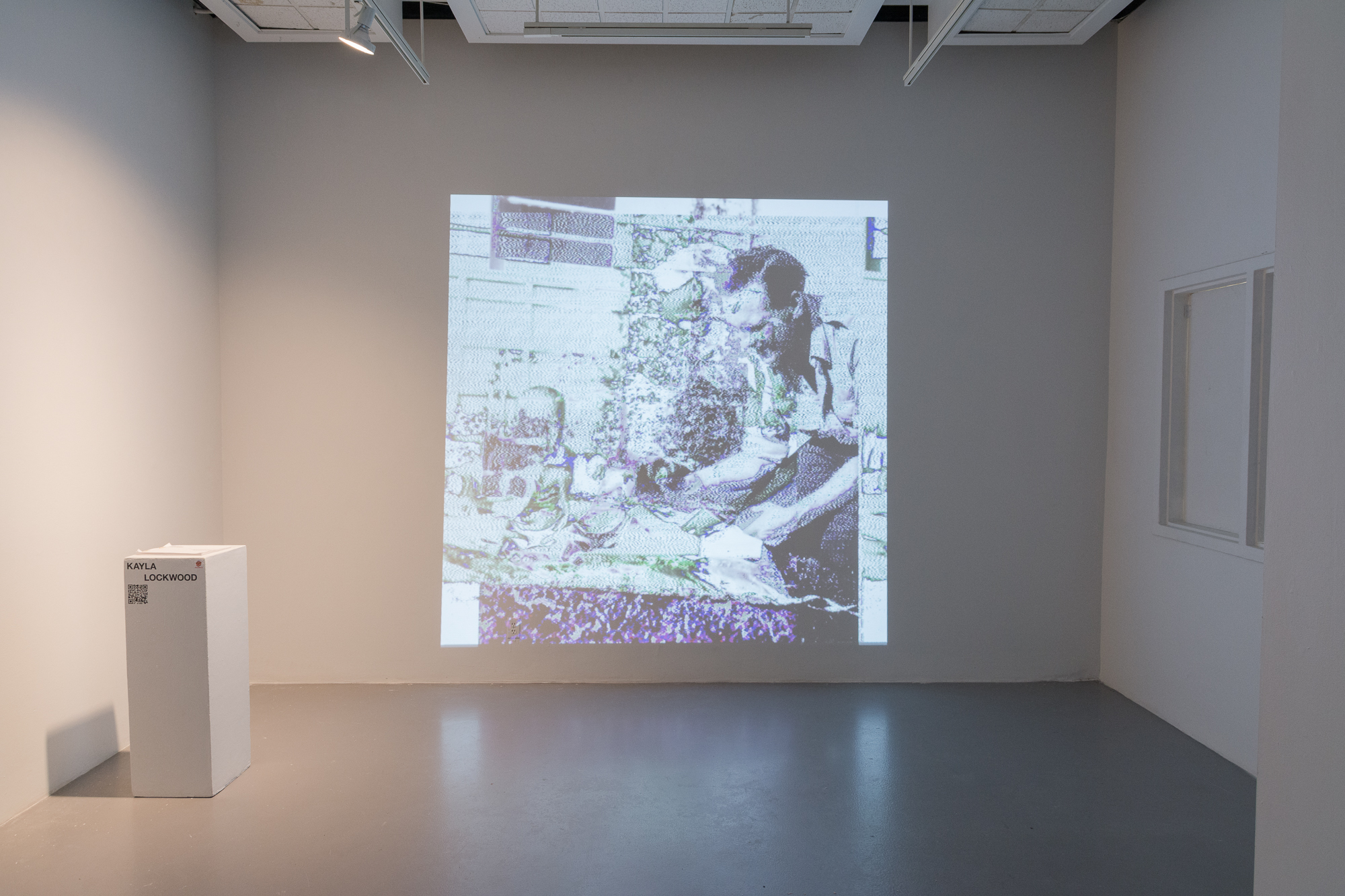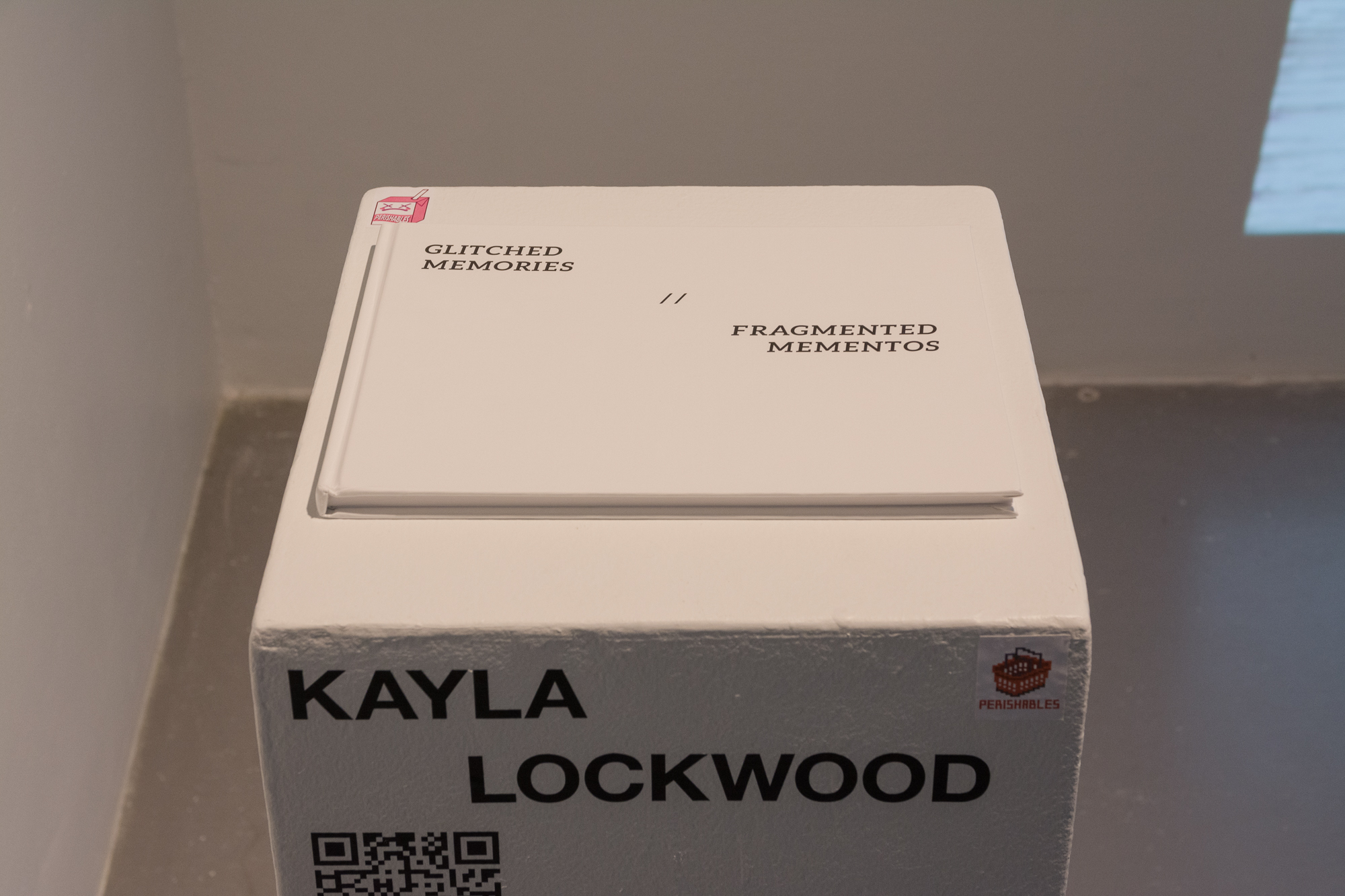
In Conversation: Kayla Lockwood
October 24, 2022
Augury House Creatives Kayla Lockwood and Kevin Yatsu sit down to talk about Kayla’s recent BFA thesis entitled Glitched Memories // Fragmented Mementos. This body of work is part of a life-long investigation of death, ancestry and memory. Using a flexible working style and non-medium specific approach, Glitched Memories // Fragmented Mementos has been presented in physical and virtual spaces as a print book and projected video.
IMMORTALITY
Do not stand at my grave and weep,
I am not there, I do not sleep.
I am in a thousand winds that blow,
I am the softly falling snow.
I am the gentle showers of rain,
I am the fields of ripening grain.
I am in the morning hush,
I am in the graceful rush
Of beautiful birds in circling flight,
I am the starshine of the night.
I am in the flowers that bloom,
I am in a quiet room.
I am in the birds that sing,
I am in each lovely thing.
Do not stand at my grave and cry,
I am not there. I do not die.
- Unknown
Do not stand at my grave and weep,
I am not there, I do not sleep.
I am in a thousand winds that blow,
I am the softly falling snow.
I am the gentle showers of rain,
I am the fields of ripening grain.
I am in the morning hush,
I am in the graceful rush
Of beautiful birds in circling flight,
I am the starshine of the night.
I am in the flowers that bloom,
I am in a quiet room.
I am in the birds that sing,
I am in each lovely thing.
Do not stand at my grave and cry,
I am not there. I do not die.
- Unknown
Kevin Yatsu: What is the context behind the poem? How old is it and how did you find it? How long have you been saving it for?
Kayla Lockwood: The poem is from a memorial card that was given to guests at my great-grandfather’s (father’s side - grandmother) funeral during the early 2000s. I don’t know how old the poem is, but I thought this poem had a profound impact on my spiritual views of death and the afterlife.
I believe that although our loved one’s have departed from the physical realm, their souls are still present. However, we need to be receptive to their presence even if we cannot visibly see them. This was especially proven to me this past summer during a Tarot reading at the Clark County Fair. My reading indicated that my loved one’s are now my guardian angels, protecting me from negative energies and are helping me heal. However, I need to work on realigning my chakras in order to be more receptive to their messages to me.
Kayla Lockwood: The poem is from a memorial card that was given to guests at my great-grandfather’s (father’s side - grandmother) funeral during the early 2000s. I don’t know how old the poem is, but I thought this poem had a profound impact on my spiritual views of death and the afterlife.
I believe that although our loved one’s have departed from the physical realm, their souls are still present. However, we need to be receptive to their presence even if we cannot visibly see them. This was especially proven to me this past summer during a Tarot reading at the Clark County Fair. My reading indicated that my loved one’s are now my guardian angels, protecting me from negative energies and are helping me heal. However, I need to work on realigning my chakras in order to be more receptive to their messages to me.
How will you communicate the idea of ancestry to the generation that comes after you?
I also pondered and asked myself the question: “How will you communicate the idea of ancestry to the generation that comes after you?” I feel that I’ll communicate the importance of knowing your ancestry and family history to the generation that comes after me through values and actions. I think it’s very important for there to be a personal archive of family data to be developed and maintained through imagery and storytelling. However, I think for such an archive to be maintained for the future generation, one must consider their values towards family and how these values shape our identity and actions. Simply put: One must put values into action and action into values.
I also pondered and asked myself the question: “How will you communicate the idea of ancestry to the generation that comes after you?” I feel that I’ll communicate the importance of knowing your ancestry and family history to the generation that comes after me through values and actions. I think it’s very important for there to be a personal archive of family data to be developed and maintained through imagery and storytelling. However, I think for such an archive to be maintained for the future generation, one must consider their values towards family and how these values shape our identity and actions. Simply put: One must put values into action and action into values.

I imagine that this project is part of a life-long journey of building a language to talk about death and to reframe ancestral histories and knowledge in a way where life and death are more adjacent to one another rather than tucked away. Is that the case? What did this project stir up?
Yes, actually this project was part of a life-long journey of building a language to talk about death and spirits. This project was based on my exploration of paranormal research through communication and unexplained phenomena. This type of research allowed me to reframe my understanding of ancestral histories and knowledge in a way where life and death are more so interconnected rather than separated. Inspiring me to further explore how life and death are viewed through my cultures as a mixed individual.
Yes, actually this project was part of a life-long journey of building a language to talk about death and spirits. This project was based on my exploration of paranormal research through communication and unexplained phenomena. This type of research allowed me to reframe my understanding of ancestral histories and knowledge in a way where life and death are more so interconnected rather than separated. Inspiring me to further explore how life and death are viewed through my cultures as a mixed individual.
How long did it take for you to settle on this project for your thesis? Was it difficult to articulate this project in the context of academia?
I settled on this project as my thesis through grief counseling while researching topics such as grief and writing, art therapy, archiving and identity-based art. I really felt that this was an important topic for me to personally investigate more into my own personal relationships, family histories and identity. I also thought it was important for the public to reflect on how their own personal relationships and family histories impacted their identity, especially as loss and grief was a common experience during the COVID-19 pandemic.
It was a bit difficult to articulate this project in the context of academia as it’s situated in such a personal space of vulnerability that I thought many people would have difficulties connecting to the main concept of reevaluating one’s identity, family histories, and the practices of grief. However, it seemed that others responded to the project and thesis with comments of personal relatability through recent experiences of loss; wanting to investigate their family histories; creating their own personal archives; or acknowledging that life continues after one’s death through spiritual practices of writing or talking.
I settled on this project as my thesis through grief counseling while researching topics such as grief and writing, art therapy, archiving and identity-based art. I really felt that this was an important topic for me to personally investigate more into my own personal relationships, family histories and identity. I also thought it was important for the public to reflect on how their own personal relationships and family histories impacted their identity, especially as loss and grief was a common experience during the COVID-19 pandemic.
It was a bit difficult to articulate this project in the context of academia as it’s situated in such a personal space of vulnerability that I thought many people would have difficulties connecting to the main concept of reevaluating one’s identity, family histories, and the practices of grief. However, it seemed that others responded to the project and thesis with comments of personal relatability through recent experiences of loss; wanting to investigate their family histories; creating their own personal archives; or acknowledging that life continues after one’s death through spiritual practices of writing or talking.
How resolute is your current view of life/death/ancestry?
It’s still challenging at times to not be able to physically hear my grandparents or go to our favorite restaurants for lunch anymore. However, I find it comforting to know that they are present when I talk aloud to a photograph of them or give them food offerings. It’s just me being a bit more receptive and accepting of their new life form.
It’s still challenging at times to not be able to physically hear my grandparents or go to our favorite restaurants for lunch anymore. However, I find it comforting to know that they are present when I talk aloud to a photograph of them or give them food offerings. It’s just me being a bit more receptive and accepting of their new life form.






